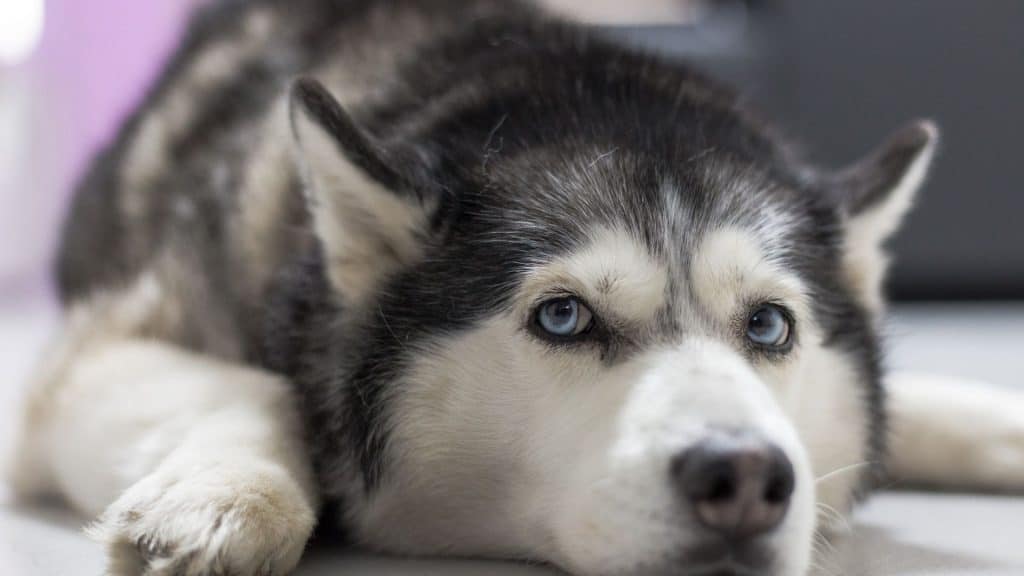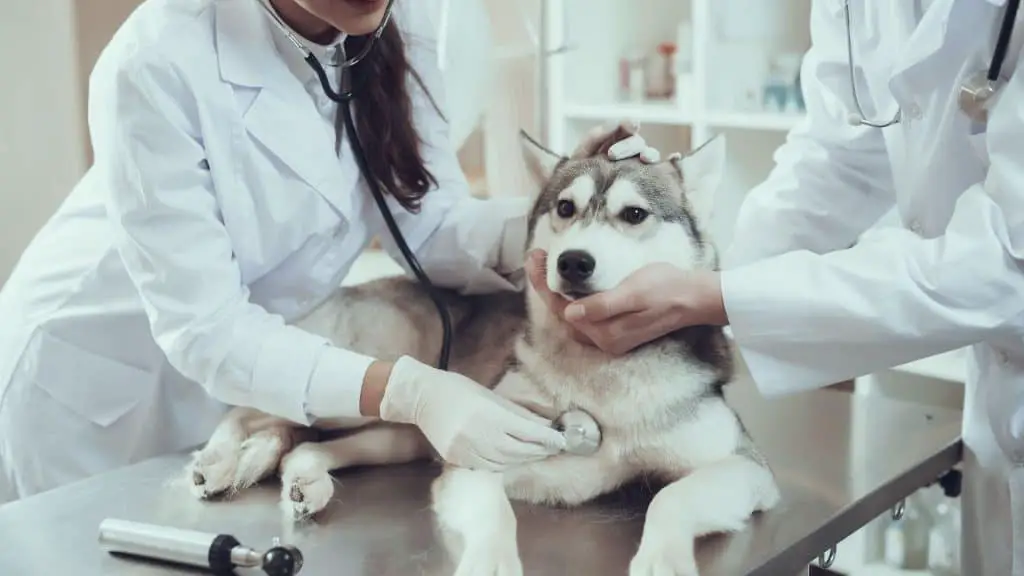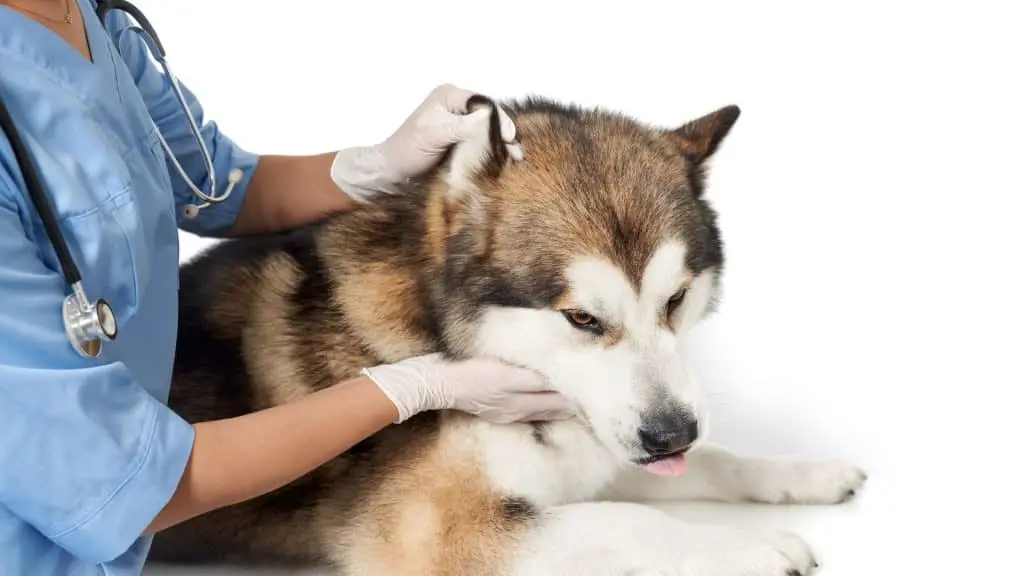What to Know
So let’s see how I can answer the question “What are Siberian huskies allergic to?” by making thing easy for you to understand the thing behind the allergic with husky.
Do you have a Siberian husky?
If you do, you may be wondering what your Husky is allergic to.
Allergies are common in Siberian huskies and can cause a lot of discomfort for your pup.
Luckily, there are ways to treat allergies and help you’re husky feel better.
This article will discuss the most common allergies in Siberian huskies and what you can do to help them.
Scroll down to learn more!
What Are Siberian Huskies Allergic To?

Siberian huskies are a popular dog breed known for their thick fur coats and friendly dispositions.
They are also known to be relatively healthy dogs with few health problems.
However, like all dogs, they can be susceptible to allergies.
While the list of things that Siberian huskies may be allergic to is not exhaustive, there are a few common allergens that these dogs may be more likely to react to.
How Do I Know if My Husky Has Allergies?
As a proud husky owner, I always look for signs that my dog might be allergic to something.
After all, these fluffy creatures are prone to allergies, just like any other dog.
Fortunately, some telltale signs can help determine whether your Husky suffers from allergies.
For starters, does your dog seem to be scratching more than usual?
It could be a sign that something is irritating his skin.
Huskies also tend to get red, watery eyes when they are allergic to something.
Another common symptom is sneezing or a runny nose.
If you notice any of these symptoms, it’s essential to take your dog to the vet for an evaluation.
With proper treatment, you can help you’re husky feel better and enjoy a healthy life.
Are Huskies Prone to Allergies?
It’s a question that has likely crossed the mind of any husky lover at some point.
Unfortunately, there is no easy answer.
While huskies are not inherently prone to allergies, they can be susceptible to various environmental and food allergies.
The best way to protect your husky from allergies is to be aware of the potential triggers and take steps to avoid them.
For example, if you know your Husky is allergic to certain grasses, you can take care to avoid letting them run in fields or parks where those grasses are present.
You can help keep your furry friend happy and healthy with a little effort and free from pesky allergies.
Are Huskies Allergic to Chicken?
No, Huskies are not allergic to chicken.
Chicken is quite a common ingredient in dog food, and it’s generally considered a healthy source of protein for dogs.
However, some dogs may be allergic to chicken or other poultry products.
A chicken allergy in dogs can include itching, skin irritation, vomiting, and diarrhea.
If you think your dog may be allergic to chicken, it’s essential to talk to your veterinarian about the best way to proceed.
In most cases, switching to a hypoallergenic diet will help to clear up the symptoms.
However, if the allergy is severe, your dog may need to avoid chicken altogether.
Are Huskies Allergic to Beef?
No, huskies are not allergic to beef.
However, some huskies may be sValiumetive to certain types of meat, such as beef, chicken, or pork.
This is because huskies are descended from wolves, which are scavengers that eat a variety of meats.
While most huskies will do just fine if fed beef, it’s always best to consult with your veterinarian to determine the best diet for your dog.
And, of course, if you’re ever in doubt about what to feed your husky, a good rule of thumb is to stick with high-quality dog food that is designed explicitly for huskies.
What Should I Not Feed My Husky?
Anyone who has ever owned a Husky knows that they are one of the most stubborn, independent breeds of dog out there.
But what many people don’t realize is that they are also one of the most sensitive.
Like people, Huskies can have food allergies or be sensitive to specific ingredients.
So, what should you avoid feeding your Husky?
Most experts agree that the best diet for a Husky is high in protein and low in carbohydrates.
This means that you should avoid feeding them table scraps and processed foods high in fillers and preservatives.
You should also avoid giving them bones, as they can splinter and cause digestive issues.
In general, it’s best to stick to a diet of high-quality dry food or raw meat.
Of course, every dog is different, and you will need to experiment to find what works best for your Husky.
But by avoiding these common mistakes, you can help ensure that your furry friend stays happy and healthy for years to come.
Symptoms of A Husky Allergy You Should Be Aware Of

Allergies in dogs are pretty standard, and while some may not experience any severe symptoms, others can have a potentially life-threatening reaction.
If you’re considering getting a husky, it’s essential to be aware of the possibility of an allergic reaction.
Here are some symptoms to watch for:
- Itching and excessive scratching
- Hives or welts on the skin
- Swelling of the face, eyes, lips, or tongue
- Difficulty breathing
- Nausea and vomiting
- Diarrhea
- Collapse
If you notice any of these symptoms in your dog, it’s essential to seek veterinary care immediately.
Husky Dog Food Allergies and How to Avoid Them
Huskies are a popular dog breed known for their thick fur coats and friendly dispositions.
However, huskies can also be prone to specific allergies, especially when it comes to their food.
One of the most common allergies that huskies suffer from is a wheat allergy.
Wheat is often found in dog food as a filler ingredient, and it can cause problems for huskies who are sensitive to it.
Another common allergy that huskies can have is an allergy to corn.
Corn is another common filler ingredient in dog food, and like wheat, it can be problematic for huskies with sensitivities.
To avoid these allergies, it’s essential to feed your husky a food free of wheat and corn.
Many grain-free dog foods are on the market specifically designed for dogs with allergies.
If you’re not sure what kind of food to feed your husky, talk to your veterinarian about the best option for your dog.
Testing Your Husky for Food Allergies

If you think your husky may have a food allergy, it’s essential to get them tested by a veterinarian.
They will be able to determine if your dog is allergic to certain ingredients in their food and recommend a diet that is safe for them to eat.
Can do two main types of testing to diagnose a food allergy in dogs: skin testing and blood testing.
Skin Testing
The most common food allergy test for dogs is a skin test.
This involves injecting a small amount of the suspected allergen under your dog’s skin and then observing their reaction over the next 48 hours.
If your dog develops a rash, hives, or other signs of irritation at the injection site, they are likely allergic to the substance.
Blood Testing
Another option for diagnosing a food allergy in dogs is a blood test.
This test looks for antibodies present in the blood when a dog is exposed to an allergen.
If these antibodies are found, your dog is likely allergic to the substance.
Both skin and blood testing are accurate ways to diagnose a food allergy in dogs.
However, skin testing is generally considered to be the more reliable method.
Treatment for Food Allergies
Once a food allergy has been diagnosed, the best way to treat it is to avoid feeding your dog the offending food.
This can be difficult, as many commercial dog foods contain multiple ingredients, so it may take some trial and error to find a food that your dog can eat without having an allergic reaction.
Several hypoallergenic dog foods are on the market specifically designed for dogs with food allergies.
These foods typically contain novel proteins, such as venison or rabbit, that are not commonly found in dog foods.
A Step by Step Guide to Test for A Husky Food Allergy
- Talk to your veterinarian about your concerns and set up an appointment for testing.
- Bring a sample of your dog’s food to the appointment.
- The vet will likely recommend a skin test first. This involves injecting a small amount of the suspected allergen under your dog’s skin and then observing their reaction over the next 48 hours.
- If your dog reacts, the vet may recommend a blood test to confirm the allergy.
- Once a food allergy has been diagnosed, the best way to treat it is to avoid feeding your dog the offending food. This can be difficult, as many commercial dog foods contain multiple ingredients, so it may take some trial and error to find a food that your dog can eat without having an allergic reaction. Several hypoallergenic dog foods are on the market specifically designed for dogs with food allergies.
- If you think your dog may have a food allergy, it’s essential to get them tested by a veterinarian. They will be able to determine if your dog is allergic to certain ingredients in their food and recommend a diet that is safe for them to eat.
How Can Supplements Help to Fix Husky Allergies?
Many supplements can help huskies with allergies.
The most common and effective supplements are omega-3 fatty acids, probiotics, and vitamin E.
Omega-3 Fatty Acids
We earn a commission if you click this link and make a purchase at no additional cost to you.
Omega-3 fatty acids are a type of fat found in fish oil.
These fats have anti-inflammatory properties that can help reduce the symptoms of allergies.
Probiotics
We earn a commission if you click this link and make a purchase at no additional cost to you.
Probiotics are live bacteria that are found in yogurt and other fermented foods.
These bacteria can help to improve the health of the digestive system, which can, in turn, reduce the symptoms of allergies.
Vitamin E
We earn a commission if you click this link and make a purchase at no additional cost to you.
Vitamin E is an antioxidant that can help to reduce inflammation.
It is often used to treat skin conditions such as eczema.
These are just a few supplements that can help huskies with allergies.
If you think your dog may benefit from a supplement, talk to your veterinarian about which one would be suitable for them.
Huskies are prone to suffering from allergies.
The best way to prevent allergies is to feed them a healthy diet and give them supplements that can help to reduce the symptoms.
Probiotics, omega-3 fatty acids, and vitamin E are effective supplements for huskies with allergies.
If you think your dog may have an allergy, talk to your veterinarian about testing and treatment options.
The above steps are a general guideline.
Every husky is different and will require a unique approach to treatment.
Be sure to work closely with your veterinarian to create a proper plan for your dog.
Conclusion
Siberian huskies are a popular breed of dog, but they can be allergic to various things.
Knowing what they’re allergic to is essential to keep them healthy and happy if you have a Siberian husky.
Contact your vet if you think your dog may be allergic to something.
They will be able to help you determine the best course of action for your pup.




